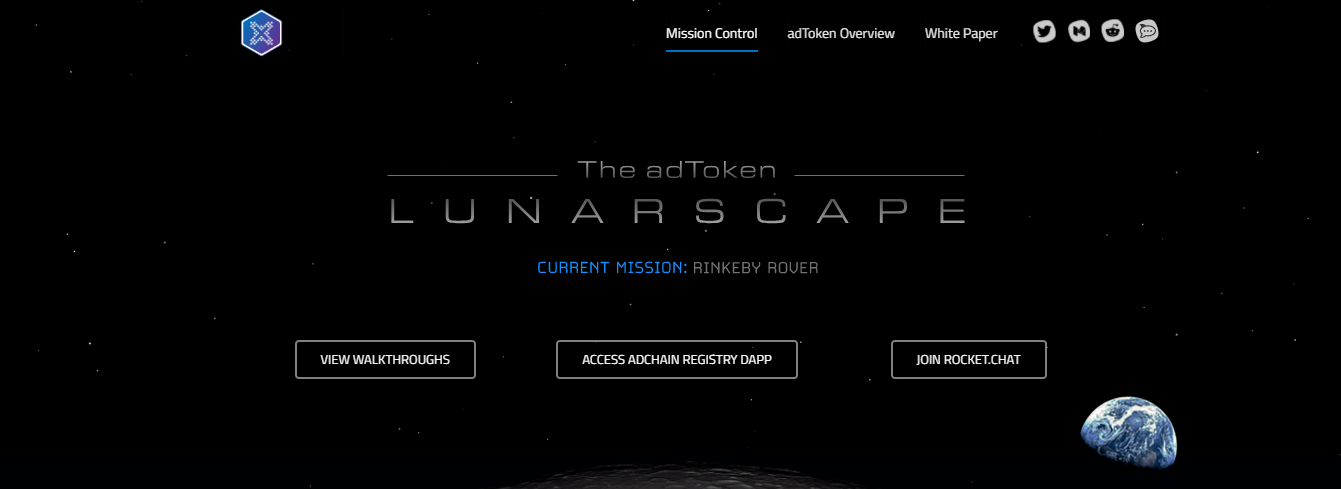According to the latest market research, ad bots cause advertisers an annual revenue loss in excess of US$16 billion. This is primarily because opaque supply chains shield botnet operators who often make use of un-auditable ad networks. Since conventional supply chains utilize a cost per mille (CPM) model, these bots can reduce the overall incentives delivered to all parties involved.
The adChain platform is a decentralized domain which makes use of an incentivized voting model to determine whether an applicant to its registry is a legitimate publisher or not. To that end, the adChain system employs smart contracts which store the domain names of network participants who have been accredited as being non-fraudulent by adToken holders.
All of this is done by letting adToken holders clearly assess domains that belong to a legitimate publisher with a real human audience in return for crypto assets.
It should also be mentioned that the adToken Registry’s interface allows token holders to propose new domain listings, as well as additional verification of said listings. Lastly, adToken holders also have the power to vote on outcomes when challenges are raised.
Overview of adChain
- Uses an intuitive AI module that helps get rid of unwanted bot traffic
- Allows for the elimination of malvertisements
- Helps coordinate the advertising supply chain so as to maximize profits for everyone involved
- Reduces issues pertaining to the systemic fraud that exists within the advertising industry today
- Helps identify spoofed domains
Key Features
To start off with, the adChain platform is browser agnostic and is based entirely on the Ethereum blockchain. It allows for digital advertising to be seamlessly integrated into pre-existing RTB and programmatic industry software solutions.
It should also be mentioned that internal transactions are driven by a currency called adToken (ADT). adToken is needed to execute all processes within this platform and is also required for a host of other activities such as:
- Voting
- Depositing entries
- Challenging entries

Overview of the platform (courtesy of the official whitepaper)
Additionally, adToken holders are given a wide array of lucrative incentives for cleaning up the supply chain by voting out fraudulent publishers from the native registry based on their background and accumulated merit points.
Since publishers within the advertising supply chain are paid according to the number of impressions they can acquire, there is an incentive for them to inflate these figures. However, adChain uses a governance model that is driven by transparency and thus helps keep a close tab on publishers’ activities.
How adChain works
This platform makes use of three core components to help achieve its goal. The first is the adChain Registry, which helps with the storing and recording of publisher domain names that have been deemed legitimate by the adChain community at large. The registry is run using smart contracts and is thus able to decouple adToken holders from the CPM incentive model.
The second component of the platform is the community of adToken Holders who are provided attractive incentives to help maintain the integrity of the adChain Registry. This is done using a voting scheme that gives token holders the ability to weed out fraudulent publishers as well as fake bot traffic.

The voting model employed within the adChain ecosystem
Importantly, adToken holders do not benefit from the number of impressions served to registrants, which allows them to act independently without any biases.
The third and final component of this platform is a virtuous cycle that helps keep the adChain registry clean of fraudulent domains. This is done by using an incentive-driven ecosystem that makes registrants renew their listings and unlisted publishers apply for new listings. As a result, scammy publishers are slowly but surely rooted out.
About adChain
One of the key people behind this venture is Mike Goldin. Mike has been working in the blockchain domain for over 4 years and previously worked as a backend dev for a startup called Ujo Music. Additionally, he works at ConsenSys and holds a degree in computer science from Columbia University.
Ameen Soleimani is also one of the primary developers of this platform. He has worked on many crypto projects that have spanned diverse fields such as:
- Peer-to-peer energy markets
- Decentralized hedge funds
Lastly, Mark D’Agostino is the person responsible for handling marketing and management activities within the company. Mark has been in the blockchain market since its very inception and has also served as an adviser for large organizations such as Deloitte and AIG. Some of his other clients include BlackRock, Citi, GE, JPM, and Lehman Brothers.
Token Performance History
When it was launched in July 2017, the value of a single ADT token was around the US$0.059 mark.

adToken lifetime performance chart (courtesy of Coinmarketcap)
However, during January of this year, the price of a single token increased to an impressive US$0.20. Since then, the price has stabilized again and the value of a single coin currently stands at US$0.08 (as of March 5, 2018).
Final Thoughts
As the problem of ad-bot driven traffic continues to flourish, publishers across the globe are employing security measures to weed out false web traffic. adChain is one such platform that will do exactly this and provide companies of all sizes with a highly user-friendly solution that can eliminate fake traffic.
In addition, adChain helps prevent the over-reporting of CPMs so that ROI can be maximized not only for ad publishers but also for network participants and other associated entities.
Past token performance should never be used as an indicator of future market potential. Thus, before investing in this currency, users should do a bit of research by themselves.
If you would like to start investing in adChain, adToken pairs are currently being offered on UpBit and Bittrex.

